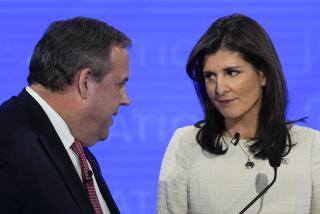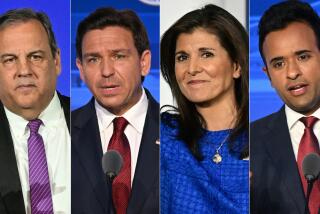GOP front-runners hedge bets on military strategy
- Share via
WASHINGTON — As President Bush struggles to maintain support in Congress for his Iraq “surge” strategy, the three leading Republican presidential contenders have been quietly backing away from any commitment to continue the buildup.
Rudolph W. Giuliani, Mitt Romney and Fred Thompson have made it clear that their original support for the escalation does not mean they are signed on to keeping the current 160,000 U.S. troops in Iraq, even as they have laid out hawkish positions on other aspects of foreign policy.
Their recent moves underscore the president’s growing isolation on Iraq as the GOP begins searching for a post-Bush foreign policy. The shifts also distance the three top contenders from Sen. John McCain (R-Ariz.), the former front-runner who Tuesday reaffirmed his commitment to the troop escalation.
With doubts about Iraq policy growing even among conservative voters, “there’s very little percentage in getting too far in front on the issue,” said John J. Pitney Jr., a Claremont McKenna College government studies professor. “If you put all your chips on the surge, you could end up a big loser.”
As Congress resumed debate on bills that could force a withdrawal of combat troops, Bush signaled that he had no intention to yield to pressure from Capitol Hill. In a speech in Cleveland, he said issues related to troop strength would “be decided by our commanders on the ground, not by political figures in Washington, D.C.”
He called on lawmakers to give Gen. David H. Petraeus, the senior commander in Iraq, “a chance to come back and tell us whether his strategy is working, and then we can work together on a way forward.” Petraeus is due to deliver a progress report in September.
Of the leading GOP contenders -- all of whom endorsed the original decision to wage war on Saddam Hussein -- Romney has been the most candid in expressing the view that the surge may not work.
If the fall assessment finds the surge is working, “then we’ll pursue this strategy and, if it’s successful, start bringing our troops home,” the former Massachusetts governor said during a campaign appearance in Iowa this month.
“If it’s not,” he said, “then we’ll have to take alternative strategies.”
Though Romney’s top rivals have said less on the subject, they too have left themselves room to maneuver.
Thompson, in a June interview with the Hoover Institution, said he worried that a wholesale withdrawal could have “an awful, awful lot of downside” -- risking lasting damage to U.S. standing.
But asked what policy the United States should be pursuing in Iraq, the former Tennessee senator said decisions had to be considered “on a day-to-day basis right now.”
--
Split is risky
Giuliani, the former mayor of New York, has called the invasion “brilliant” and warned of the risks of an abrupt withdrawal. But in an interview Monday with WBZ-TV in Boston, Giuliani said he had “a lot of questions” about the buildup, although he still hoped it would work.
Political strategists say that because the Republican candidates need the support of conservative voters during the primaries, they cannot afford to split too openly with Bush on the war. At the same time, becoming too committed to the buildup could alienate other voters in the general election.
And there is a possibility that Congress will force a reluctant Bush to adopt a new strategy.
“How can you marry yourself to the Bush strategy, since you don’t know what it is?” asked Grover Norquist, a conservative activist who is close to the White House. He said that “in September, there may be this sudden bend in the road. You can’t sign on to the Bush policy, because that’s buying a pig in a poke.”
He said McCain’s position in the race weakened noticeably at the beginning of the year, as the Arizona senator became strongly associated in the public’s mind with the troop increase plan. The deterioration of McCain’s standing was underscored Tuesday as his campaign manager, chief strategist and at least two other aides left in a major staff shake-up.
After his sixth trip to Iraq, McCain appeared on the Senate floor Tuesday to call for a continuing commitment to the buildup. He said that although violence in Baghdad “remains at unacceptably high levels,” Iraq appeared to be heading “in the right direction.... The progress our military has made should encourage us.”
But new polling suggests how difficult it has become for candidates and lawmakers to be tethered to the Iraq strategy and the president who devised it.
A Gallup poll released Tuesday showed that 42% of Republican voters wanted to remove all U.S. troops from Iraq by April 2008, except for a small number involved in counter-terrorism operations. In the same poll, 37% of Republican voters said Bush’s troop surge was improving the situation in Iraq.
The Gallup polling put Bush’s disapproval rating at 66%, the worst of his presidency.
In the history of Gallup polling, dating to the Franklin D. Roosevelt administration, Bush’s 66% rating tied him with President Nixon for the second-worst ever recorded. The worst, 67%, was logged by President Truman.
Meanwhile, Democratic presidential candidates on Tuesday attempted to sharpen the distinctions among them over Iraq to assert their individual commitment to ending the war.
Barack Obama and John Edwards sought to capitalize on what they see as front-runner Hillary Rodham Clinton’s vulnerability when it comes to the Iraq war.
--
Democrats on war
During a campaign stop in Des Moines, Sen. Obama (D. Ill.) sought to distinguish his position from that of Sen. Clinton (D-N.Y.), who has been criticized by the party’s liberal wing for voting to authorize the war in 2002 and being slow to demand troop withdrawals.
“When I opposed this war before it began in 2002, I was about to run for the United States Senate, and I knew it wasn’t the politically popular position,” Obama said.
Edwards, a former senator from North Carolina who had voted to authorize the war, released a statement Tuesday suggesting that responsibility for ending the war rests with Congress -- and, by implication, with Clinton and Obama.
Though he did not mention his rivals by name, Edwards said that by withholding funds, Congress could force an end to the war.
“Congress should no longer facilitate the president’s stubborn allegiance to his failed strategy. It’s not enough to talk a good game anymore. It is time to act,” Edwards said.
The war has long been politically treacherous ground for Clinton. As the solitary woman in the campaign, the New York senator has been wary of looking weak when it comes to national security.
Unlike Edwards, she has not apologized for her 2002 vote authorizing the war.
Yet as mainstream Democrats have joined liberals in turning against the conflict, Clinton has cast herself as every bit as zealous as her presidential rivals in opposing the war.
In Iowa on Tuesday, she reiterated her plan for ending the war, which entails bringing combat troops home, ratcheting up aid to Iraq and emphasizing diplomacy.
Clinton sought to dispel lingering unhappiness over her 2002 vote with a withering critique of Bush’s management of the war.
“The catalog of miscalculations, misjudgments and mistakes in Iraq shocks the conscience,” she said.
Her message is that when it comes to Iraq, she and other candidates for the Democratic nomination are not all that far apart.
Not all her rivals agree.
In a debate in New Hampshire last month, Edwards said: “There are differences between us. And I think Democratic voters deserve to know the differences.”
--
peter.nicholas@latimes.com
More to Read
Get the L.A. Times Politics newsletter
Deeply reported insights into legislation, politics and policy from Sacramento, Washington and beyond. In your inbox twice per week.
You may occasionally receive promotional content from the Los Angeles Times.











